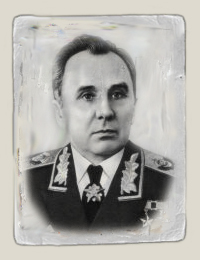Kirill Moskalenko
 11. 5. 1902 - 17. 6. 1985 11. 5. 1902 - 17. 6. 1985Kirill Moskalenko commanded the 40th Army of the Voronezh Front; Colonel-General, Chief Inspector of the USSR Ministry of Defence - Deputy Minister of Defense, Marshal of the Soviet Union. He was born on May 11, 1902 in Grishin (now Krasnoarmeysky district of the Donetsk region) in a peasant family. Ukrainian. A member of the CPSU (B) since 1926. He graduated from the village school. Joined the Red Army in 1920. Took part in the Civil War. Red Army soldier, K. Moskalenko fought with the Whites and Makhno’s group in the Ukraine and Crimea, against counter-revolutionary bands at the Don and in the Northern Caucasus. In 1922, after graduating from Ukrainian Joint School of Red Commanders he served in the North Caucasus and the Belorussian Military Districts, headed a platoon, battery, battalion, was chief of staff and artillery regiment. In 1928 he graduated from the artillery advanced courses for the Red Army commanders. Since 1934, K. Moskalenko commanded the artillery regiment. From June 1935 was Artillery Chief of the 23rd Mechanized Brigade in the Far East, and from September 1936 – the 133rd Mechanized Brigade of the Kiev Military District. In 1939 he graduated from the faculty to improve the high command of the Military Academy named after F. Dzerzhinsky, and was appointed chief of artillery of the 51st Perekop Infantry Division. Participated in the Soviet-Finnish War of 1939-40. Then was Chief of Artillery of the 35th Rifle; and from August 1940 to May 1941 - 2nd Mechanized Corps in the Odessa Military District. From May 1941 he commanded the 1st motorized antitank artillery brigade. When he was a commander of this brigade, the Great Patriotic War started. Then he commanded the 15th infantry, the 6th Cavalry Corps and the horse-mechanized group. He took part in defensive battles in south-western front at Vladimir-Volyn, Rovno, Novograd- Volyn, Kiev, and Chernigov, and in an offensive operation on the right wing of the Southwestern Front in the Battle of Moscow. At the end of 1941 he was deputy commander of the 6th Army, from March 1942 consistently commanded the 38th, the 1st Tank, the 1st Guards and the 40th Armies. Moskalenko’s troops fought at Kharkov, the Don, at the Battle of Stalingrad. The 40th Army as part of the Voronezh Front was involved in Ostrogozh-Rossoshansk, Voronezh-Kastornoye and Belgorod-Kharkov offensive operations, as well as in the Battle of Kursk and the Dnieper crossing. By the Decree of the Presidium of the Supreme Soviet on October 23, 1943 for his courage and heroism shown during the Dnieper crossing and securing bridgeheads on its western bank, Commander of the 40th Army, Colonel-General Kirill Moskalenko was awarded the honorary title of Hero of the Soviet Union, the Order of Lenin and the Gold Star medal(# 2002). On October 27, 1943 until the end of the war, K. Moskalenko again commanded the 38th Army which was part of the 1st Ukrainian Front; participated in the Kiev, Zhitomir-Berdichev, Proskurov-Chernovtsy, Lvov-Sandomierz, Carpathian and in the 4th Ukrainian Front - in the Western Carpathians, Morawska-Ostrava and Prague offensive operations. General Moskalenko’s troops distinguished themselves at Lvov while breaking strong, deeply layered defense, as well as capturing Kiev, Zhitomir, Zhmerynka, Vinnitsa, Lvov, Moravska-Ostrava and others ... For successful operations Moskalenko’s troops were noted in the Orders of J. Stalin 18 times. After the war, from 1945 to 1948, K. Moskalenko commanded the army, and then - the troops of Moscow district defense. In this position, at the request of Secretary of the CPSU, N. Khrushchev and Chairman of the Council of Ministers of the USSR, G. Malenkov, Colonel-General K. Moskalenko selected a group of soldiers including Marshal Zhukov, Colonel-General Batitsky, and leading it, on June 26, 1953 took part in the arrest of Deputy Chairman of the Council of Ministers, Minister of Internal Affairs of the USSR, Marshal L. Beria, who later was accused of “anti-Party and anti-national activities aimed at undermining the Soviet Union”, and was deprived of all the awards and titles, and on December 23, 1953 was sentenced to death, and on the same day reprieved. After those events, and until 1960, K. Moskalenko commanded the troops of the Moscow Military District. In 1955 he was awarded the highest military rank of Marshal of the Soviet Union. From 1960 to 1962, Marshal Moskalenko was Chief of the Strategic Rocket Forces - Deputy Minister of Defence. On April 12, 1961 at the “Baikonur” he watched the first in the history of Mankind space flight of astronaut number 1, Yu. Gagarin. Since 1962 he was chief inspector of the Ministry of Defence - Deputy Minister of Defence. By the Decree of the Presidium of the Supreme Soviet on February 21, 1978 for services to his country in the development and strengthening of the Soviet Armed Forces Kirill Moskalenko was awarded a second Gold Star medal (# 105). Since 1983 he was in the Group of General Inspectors of the Ministry of Defence. A member of the CPSU Central Committee since 1956. A member of the Supreme Soviet of the USSR of the 2nd-11th convocations. Marshal Moskalenko died on June 17, 1985. He was buried at Novodevichy Cemetery in Moscow. He was awarded seven Orders of Lenin, the Order of the October Revolution, five Orders of the Red Banner, two 1st Class Orders of Suvorov, two 1st Class Orders of Kutuzov, the 1st Class Order of Bogdan Khmelnitsky, the 1st Class Order of the Patriotic War, the 3rd Class Order “For Service to the Motherland in the USSR Armed Forces”, medals and foreign orders. In 1969 he was awarded the title of Hero of the Czechoslovak Socialist Republic. A bronze bust of twice Hero of the Soviet Union, K. Moskalenko was installed in Krasnoarmeysk, Donetsk region, and a plaque - in Kharkov. |




